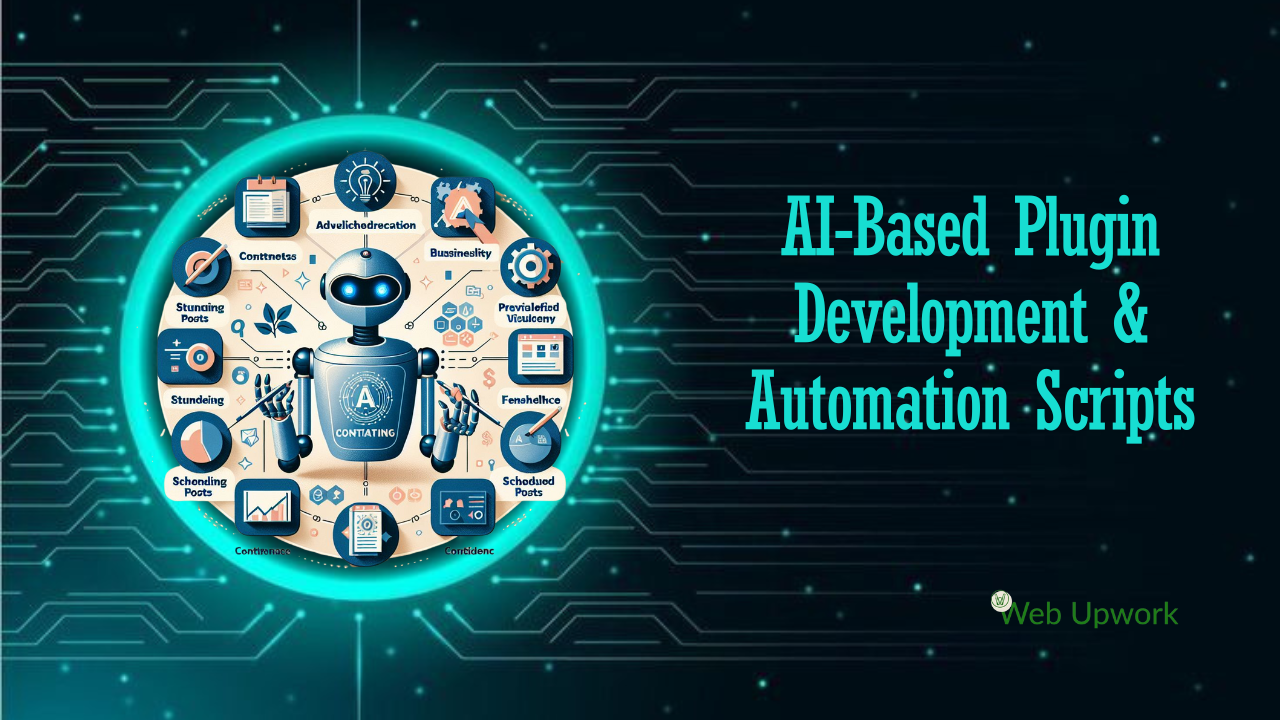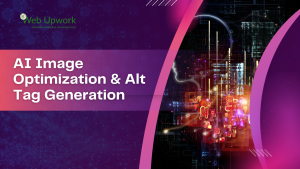As a web designer, I’ve always believed that technology should make work easier, faster, and smarter. In the world of WordPress and web development, we’re already seeing how Artificial Intelligence (AI) is changing the way plugins and automation scripts are created and used.
Whether it’s simplifying daily tasks, enhancing user experience, or automating backend operations, AI-based plugin development is now at the heart of modern web functionality. What used to take hours of manual coding can now be done in minutes with the help of intelligent scripts and machine learning algorithms.
What Is AI-Based Plugin Development?
AI-based plugin development is about using artificial intelligence to create smarter, more adaptive plugins that learn from user behaviour and improve over time. These plugins can perform automated tasks, analyse data, and make decisions that were once only possible with manual human intervention.
For example, think of a WordPress plugin that automatically recommends blog topics based on your writing style or previous posts. Or a plugin that can detect and fix SEO issues, generate meta tags, and optimise content for better rankings. These are real examples of how AI is being integrated into plugin development today.
Why AI Plugins Are Transforming the Web
Traditionally, plugins were rule-based- they worked only within the limits of pre-coded instructions. But with AI, plugins can now learn, adapt, and improve continuously.
Here are a few key benefits of AI-based plugins:
Smarter Decision Making – AI plugins analyse user data, traffic, and engagement patterns to provide real-time insights.
Automation of Repetitive Tasks – From content generation to form handling, AI scripts automate tasks that used to take hours.
Enhanced Personalisation – AI plugins can customise website content, product recommendations, and layouts based on each visitor’s behaviour.
Performance Optimisation – They monitor website performance, predict issues, and even self-correct problems before they impact the site.
Time and Cost Efficiency – Businesses save both time and money since many routine tasks are handled automatically.
The Role of Automation Scripts
Automation scripts are small pieces of code that perform predefined tasks automatically. They’re not new in web development, but now, with AI integration, they’ve become more advanced.
In simple terms, automation scripts combined with AI can think logically. Instead of just performing a fixed action, they can evaluate conditions, analyse data, and then act accordingly.
For example:
An AI automation script can scan all new blog posts and automatically assign SEO-friendly categories and tags.
Another script can identify when a website’s loading speed drops and automatically compress images or clear cache.
Some scripts even integrate with CRM systems to send personalised follow-up emails to leads based on website activity.
In WordPress, this means a website can now handle tasks like content scheduling, lead nurturing, security checks, and analytics – all without human supervision.
Practical Use Cases in Web Design
Here are a few real-world ways AI-based plugins and automation scripts are improving the web experience:
AI Chatbots for Customer Support – Plugins powered by natural language processing handle customer queries instantly and learn from every interaction.
SEO Automation Tools – Plugins that automatically analyse on-page content, suggest keywords, and generate schema markup.
Smart Form Handlers – Forms that detect spam, auto-fill fields for returning users, and predict the best conversion design.
AI Image Optimisers – Plugins that compress, rename, and tag images intelligently for SEO.
Predictive Analytics Plugins – These use AI to forecast trends and user behaviour, helping businesses make informed decisions.
Automated Security Scripts – AI tools that detect unusual activity, block threats, and send real-time alerts.
As a designer, these tools allow me to spend more time on the creative side – focusing on design, branding, and storytelling – while the technical maintenance runs automatically in the background.
From my experience, AI-based plugin development is one of the biggest shifts happening in the WordPress ecosystem. Earlier, plugin creation was all about functionality – “Does it work or not?” Now, it’s about intelligence – “Can it learn, adapt, and improve on its own?”
AI plugins not only handle technical work but also provide insights that help developers make better design and content decisions. Automation scripts, on the other hand, take care of daily repetitive tasks that often slow down productivity.
I’ve personally seen how integrating automation into client websites has reduced their maintenance time and improved performance. Tasks like updating products, monitoring SEO, or handling lead forms now happen almost automatically – giving clients peace of mind and more time to focus on their business goals.
The Future of AI in Plugin Development
The future looks promising. As AI continues to evolve, we’ll see even more advanced plugins that combine automation, analytics, and predictive technology. Soon, WordPress websites will be able to self-manage – detecting broken links, optimising images, rewriting content, and enhancing design layouts without human input.
Developers will move from writing endless lines of code to training AI systems that can code, test, and deploy plugins independently.
In my opinion, this marks the next phase of intelligent web development – where creativity meets automation. Designers and developers won’t be replaced by AI; instead, they’ll be supported by it, creating faster, smarter, and more interactive websites.
AI-based plugin development and automation scripts are redefining how we build and maintain websites. They bring intelligence, efficiency, and scalability into web design. For professionals like me, it’s an exciting time – because we’re not just designing websites anymore, we’re creating systems that learn, adapt, and evolve with every interaction.
Product Schema
{% if template.name == 'product' %}
<script type="application/ld+json">
{
"@context": "https://schema.org/",
"@type": "Product",
"name": "{{ product.title }}",
{%- if product.featured_media -%}
{%- assign media_size = product.featured_media.preview_image.width | append: 'x' -%}
"image": [
{{ product.featured_media | img_url: media_size | prepend: "https:" | json }}
],
{%- endif -%}
"description": {{ product.description | strip_html | json }},
"sku": "{{ current_variant.sku }}",
"mpn": "{{ current_variant.barcode }}",
"brand": {
"@type": "Brand",
"name": "District A Design"
},
"review": {
"@type": "Review",
"reviewRating": {
"@type": "Rating",
"ratingValue": "5",
"bestRating": "5"
},
"author": {
"@type": "Person",
"name": "Example site"
}
},
"aggregateRating": {
"@type": "AggregateRating",
"ratingValue": "5",
"reviewCount": "5"
},
"offers": {
"@type": "Offer",
"url" : {{ shop.url | append: variant.url | json }},
"priceCurrency" : {{ cart.currency.iso_code | json }},
"price" : {{ current_variant.price | divided_by: 100.00 | json }},
"priceValidUntil": "{{ 'now' | date: '%s' | plus: 31536000 | date: '%Y-%m-%d' | uri_encode | replace:'+','%20' }}",
"itemCondition": "https://schema.org/NewCondition",
"availability" : "http://schema.org/{% if product.available %}InStock{% else %}OutOfStock{% endif %}"
}
}
</script>
{% endif %}
BreadcrumbList Schema
<script type="application/ld+json">
{
"@context": "https://schema.org",
"@type": "BreadcrumbList",
"itemListElement": [{
"@type": "ListItem",
"position": 1,
"name": "Home",
"item": "https://Examplesite.com/"
},{
"@type": "ListItem",
"position": 2,
"name": "{{ product.title }}",
"item": "{{ shop.url }}{{ product.url }}"
}]
}
</script>





